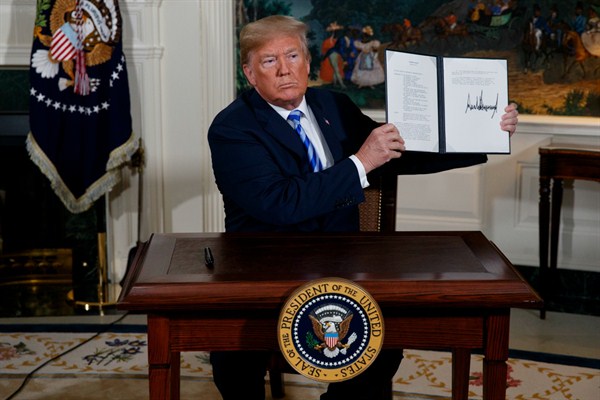In May, President Donald Trump withdrew the U.S. from the international nuclear deal with Iran, which was negotiated and signed by both countries along with France, the United Kingdom, Germany, Russia and China. The agreement, known officially as the Joint Comprehensive Plan of Action, or JCPOA, had imposed strict controls and oversight on Iran’s domestic nuclear program, in return for the easing of multilateral sanctions and the suspension of U.S. unilateral sanctions on Iran.
In withdrawing from the deal, Trump promised to reimpose sanctions targeting Iran’s oil industry, as well as so-called third-party sanctions on any companies that did business with or invested in the country, following a waiting period to allow for winding down operations and severing ties. Today, the U.S. announced that the waiting period had officially ended for third-party sanctions on non-oil sector commerce with Iran. Sanctions on the oil sector will go into effect in November.
World Politics Review has covered various facets of the story as it unfolded over the past few months, including the impact of U.S. policy on Iran’s economy and America’s relations with its European allies, and the implications for China. This collection of five recent articles offers comprehensive analysis and context to better understand today’s breaking news.
With U.S. Sanctions Looming, Iran Faces a Potentially Explosive Economic Crisis
Mohsen Milani | Aug. 2, 2018
A few years after Iran’s 1979 revolution, Ayatollah Ruhollah Khomeini disregarded an aide who was worried about inflation by declaring that “this revolution was not about the price of watermelons.” His successors may not have the luxury of assuming that the Islamic Republic’s religious essence is more important to most Iranians than their economic situation. Indeed, the proverbial price of watermelons has now plunged Iran into a potentially explosive economic crisis, with waves of public protests. The situation has been exacerbated by Trump’s decision to violate the terms of the nuclear deal with Iran and reimpose sanctions.
Iran’s Oil Sector Was Bouncing Back. Can It Survive Renewed U.S. Sanctions?
Thijs Van de Graaf | May 17, 2018
At the heart of the U.S. sanctions are measures targeting Iran’s oil and gas sector, which will come back into effect in November. It is unlikely, however, that the reimposed sanctions will be as successful as the joint U.S.-European Union sanctions of 2012, which knocked more than 1 million barrels per day of Iranian oil out of the market. The key difference is that, in 2012, the EU was standing shoulder to shoulder with the U.S. in confronting Iran. Today, France, Germany and the U.K. have said they still stand by the Iran deal. The EU is currently even considering several options to shield its companies from U.S. sanctions. However, the bulk of Iran’s oil exports go to Asia—China, India, South Korea and Japan. While South Korea and Japan already started throttling back their purchases of Iranian oil earlier this year in anticipation of the return of U.S. sanctions, China and India are the key actors.
The Trump Administration’s Magical Thinking About Iran
Judah Grunstein | May 23, 2018
In late May, after having withdrawn from the JCPOA, the Trump administration formulated a list of demands that Iran would have to meet in order to normalize relations with Washington. As far as demands for international behavior go, the Trump administration’s were reasonable. The problem is that they read more like a wish list than a realistic and achievable end state in U.S.-Iran relations—a call for surrender rather than negotiation and engagement. The U.S.-led international consensus that made sanctions so effective in the run-up to the nuclear deal has not survived the unilateral U.S. withdrawal from the agreement. As a result, economic pressure alone likely won’t be enough to bring Iran back to the negotiating table, leaving military intervention as the only recourse if Iran does restart its nuclear program. That’s not to say the Trump administration’s policy has no defenders. But the divide seems to be among those who see Iran and the Middle East as the U.S. wants them to be, and those who see them as they really are.
The Iran Deal Exposes Europe’s Weaknesses as a Global Power
Judah Grunstein | May 16, 2018
In response to Trump’s decision to withdraw from the Iran deal, German Chancellor Angela Merkel solemnly declared that from now on Europe would have to take its destiny in its own hands. It’s hard to disagree with Merkel. But that was already true the first time she expressed the sentiment in May 2017, after Trump’s first visit to Europe as U.S. president. In the meantime, Europe has not done anything to fundamentally address the challenge of managing trans-Atlantic relations under Trump. In the aftermath of the U.S. withdrawal from the JCPOA, it has become clear that Europe will be hard pressed to back up its outrage with actions to defend the agreement—and its interests.
Why Trump’s Hard Line on Iran Could Benefit China Most of All
Atman Trivedi, Olivia Sterling | June 13, 2018
Intent on undoing a key piece of President Barack Obama’s foreign policy legacy, Trump seems to be spoiling for a fight with Tehran. But his Iran adventure will only overextend the U.S. further, at a time when the Trump administration has already spread itself thin, particularly in Asia. Trump, of course, is also caught up in other diplomatic high-wire acts, most of all diplomacy with North Korean leader Kim Jong Un over the potential but hard-to-parse “denuclearization” of the Korean Peninsula. China, by contrast, is playing a steadier long game. So far, U.S. allies in Asia have picked up the Trump administration’s slack. But Washington’s continued inattentiveness to their concerns, to say nothing of Trump’s fights with friends like Japan and South Korea over trade policy, will inevitably lead them to hedge their bets, either by forming partnerships that leave out America or by accommodating China.
[marketing]boilerplate[/marketing]

